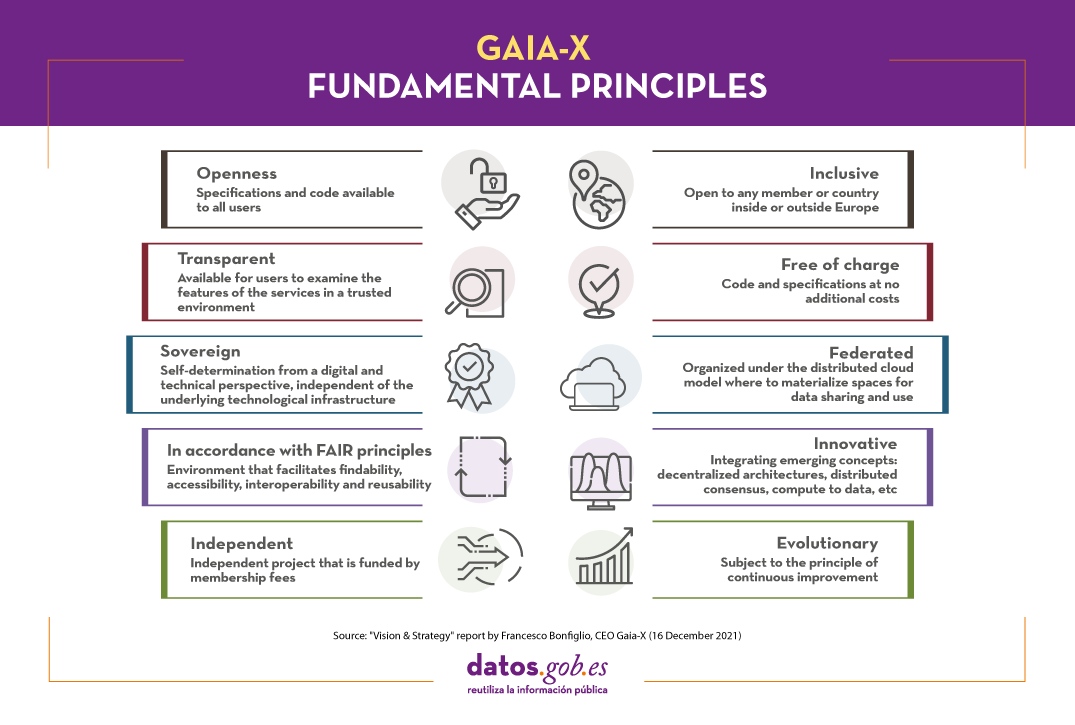
The application of new techniques aimed at extracting value from data has become a reality in the current environment, accelerating its transformation into knowledge for decision making. Therefore, it is common to focus on the exploitation of data as an indispensable part of its management, arising linked to the concept of its exploitation the concept of data space, enabling its sharing, involving both the private sector and the different public agencies, whether local, national or international.
A data space is an ecosystem where the voluntary sharing of its participants' data materializes within an environment of sovereignty, trust and security, established through integrated governance, organizational, regulatory and technical mechanisms. The concept of sovereignty is key, understood as the ability of a participant to maintain control over its own data, expressing the terms and conditions that will govern its permitted uses.
What is Gaia - X?
In this context, the Gaia-X initiative was born, a European private sector initiative for the creation of an open, federated and interoperable data infrastructure, built on the values of digital sovereignty and data availability, and the promotion of the Data Economy. The challenge is to establish an ecosystem in which data from European entities are available and shared in a trusted and managed environment according to European principles of decentralization, openness, transparency, sovereignty and interoperability.
Gaia-X aims to develop a federation of cloud data services, enabling cooperation and data sharing between companies and organizations across the European Union independently of infrastructure providers. Gaia-X defines the technical concepts, as well as the governance, for the interoperability of datasets and data infrastructures, assuming the role of orchestrator, mediating between data providers and data consumers via the federated services, and creating a physical decoupling between the data layer and the infrastructure layer.
From the origins
The Gaia-X initiative began to see the light of day in October 2019, when the French and German ministries of economic affairs presented the project. Since then, its growth has been exponential. At the end of 2020, a summit was held, leading to the founding of the Gaia-X association AISBL in January 2021. During that year, Gaia-X is defined as a brand, as well as the first versions of its services. Among its objectives is the development of common standards, best practices, tools, as well as governance mechanisms.

Gaia-X currently has 324 members around the world. Companies, associations, research institutions, administrations and politicians have joined forces to work together in the initiative. The 22 founding members are divided between France and Germany, where organizations such as Amadeus, Atos, OVH, Orange Business Services, Siemens, IDS, SAP SE and Deustche Telekom stand out. However, these 22 have been joined over the years by private and public organizations from Asia (China, India, Japan, Singapore, Qatar, Korea), the USA and mainly Europe (Austria, Belgium, Estonia, Finland, France, Germany, Greece, Poland, Ireland, Italy, Lithuania, Luxembourg, the Netherlands, Poland, Portugal, Slovakia, Slovenia, Spain, Sweden, Switzerland, the UK).
In Spain, in mid-2021, the Ministry of Economic Affairs and Digital Transformation, through the Secretary of State for Digitalization and Artificial Intelligence, promotes the creation of the Gaia-X national hub, an organizational initiative whose objective is to accelerate European capacity in industrial/sectoral data sharing and digital sovereignty, contributing to generate the common European infrastructure, through the launch of a manifesto of interest whose response from private sector companies was overwhelming.
In this way, Spain also joins the Government Advisory Board of Gaia-X, the European partnership to accelerate the response to data sharing. The Spanish Gaia-X Hub seeks that companies of all sizes create community around data, serving to develop and implement innovative solutions based on data and Artificial Intelligence, which boost national competitiveness, paying special attention to SMEs and micro-SMEs. Thus, it is proposed the creation of data spaces in the different productive sectors, interoperable with European spaces and without interfering in other spaces that the industry has planned to develop.
The data economy in Spain
This project aims to contribute to the economic growth of our country. According to the European Data Market study, the data economy in Spain had in 2019 a value equivalent to 2.5% of the national GDP, and it is estimated that by 2025, this value will represent more than 4% of the Spanish GDP, provided that the appropriate legal, political and financing environment is created, which highlights the importance of data in the economy.
Spain's commitment to the data economy is part of the Digital Spain 2025 strategy, which highlights the need to support the digitization of key sectors for the economy, such as tourism and healthcare in particular, but also others such as mobility, the agri-food sector and e-commerce.
Conclusions
Data are the focus of the major transformations taking place in today's environment as a result of the application of new digital technologies. For this reason, no digital economy will be able to consolidate and compete globally without a strong data economy.
The European strategy aims to create a single European data market, open to data from all over the world, in which personal and non-personal data, including sensitive business data, is secure and businesses have access to high-quality industrial data in a way that drives growth and creates value. Through the associated rules and mechanisms, the aim is to ensure that data can flow, European standards and values are fully respected, and the rules for data access and use are fair, practical and clear.
Data spaces in general, and initiatives such as Gaia-X in particular, are key elements in achieving the objectives of the European strategy, serving to foster ecosystems that create new products and services based on more accessible data.
Content prepared by Juan Mañes, expert in Data Governance, with contributions from the Data Office.
The contents and views expressed in this publication are the sole responsibility of the author.